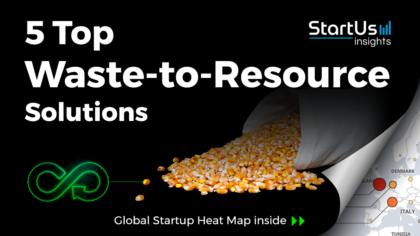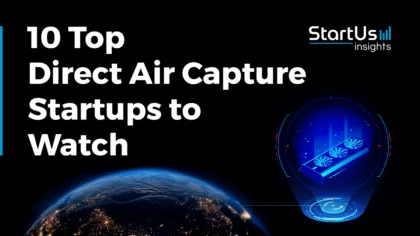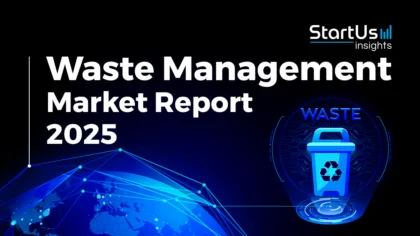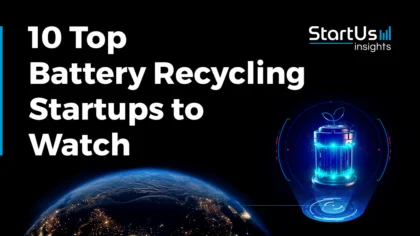Accelerate Productivity in 2025
Reignite Growth Despite the Global Slowdown
Staying ahead of the technology curve means strengthening your competitive advantage. That is why we give you data-driven innovation insights into the circular economy. This time, you get to discover 5 hand-picked waste-to-resource solutions.
Global Startup Heat Map highlights 5 Top Waste-to-Resource Solutions out of 647
The insights of this data-driven analysis are derived from the Big Data & Artificial Intelligence-powered StartUs Insights Discovery Platform, covering 2.093.000+ startups & scaleups globally. The platform gives you an exhaustive overview of emerging technologies & relevant startups within a specific field in just a few clicks.
The Global Startup Heat Map below reveals the distribution of the 647 exemplary startups & scaleups we analyzed for this research. Further, it highlights 5 circular economy startups that we hand-picked based on criteria such as founding year, location, funding raised, and more. You get to explore the solutions of these 5 startups & scaleups in this report. For insights on the other 642 waste-to-resource solutions, get in touch.
PyroCore develops Pyrolysis Tech
Organizations across industries generate tonnes of waste that gets dumped in landfills, adding to their carbon footprint. As a result, waste management startups are working towards transforming this waste, especially the non-recyclable kind, into energy. Startups utilize methods like pyrolysis, a technology that uses the thermal decomposition of waste at high temperatures. This not only benefits the environment but also satisfies the corporate environmental responsibility of the companies. Moreover, the residual materials such as metals and glass are recycled, further contributing to the circular economy.
British startup PyroCore uses pyrolysis tech to convert clinical, textile, food, automotive, and electrical waste and non-recyclable plastics into thermal energy. The pyrolysis kiln reduces the waste to a thermally decomposed solid char and raw syngas. The gas enters the energy recovery system where it is converted into thermal energy. The startup offers both portable and permanent versions of the solution. The permanent version is easy to install in existing facilities, saving utility costs.
Reurasia advances Anaerobic Digestion
Pyrolysis is one of the most common technologies for generating energy from waste, However, it produces high levels of carbon monoxide that require extra steps for removal. So, startups are deploying alternative methods like anaerobic digestion. In this, microbes break down organic matter such as agricultural and food waste in the absence of oxygen to produce renewable energy like electricity and heat. Moreover, the residue finds use as biofertilizers.
Reurasia is a Filipino startup that offers waste-to-energy solutions to tackle wastewater, sludge, and solid waste. The wastewater treatment process uses a high concentration of anaerobic bacteria to treat wastewater from paper mills, food processing factories, breweries, and pharmaceutical companies. The concentrated anaerobic solution also converts solid wastes such as manure, silage, biomass, agriculture residues, and food wastes. By converting waste into renewable energy, the startup advances the circular economy.
Waister provides Wet Waste Upcycling
Tackling wet waste is more challenging than managing solid waste. It spills and attracts more rodents and insects as it decays faster. Moving the waste is also inconvenient, which leads to costlier logistics. As it is difficult to recycle or reuse wet waste, it usually ends up in landfills, contributing to greenhouse gas emissions. Hence, startups are deploying technologies like mechanical fluidization and superheated steam to valorize wet waste into raw materials.
Norwegian startup Waister enables reuse and upcycling of wet waste like food waste and waste from breweries and aquaculture through a drying technology. The startup’s dryers use a combination of mechanical fluidization and superheated steam, which creates a compact and energy-efficient dryer. It turns wet waste into materials useful products like bio-fertilizers, biogas booster, and feed or pet food ingredients.
TicInsect provides Food Waste Upcycling
Apart from typical waste-to-energy methods like pyrolysis and incineration, cleantech startups are also turning to efficient bioconversion methods for transforming organic waste into resources. For instance, using insects to convert food waste into useful materials. Insects naturally feed on organic waste and certain larvae even produce useful products like oils that can act as substitutes for fossil fuels. Thus, insects offer a waste management solution that also leads to circular production with minimum carbon emission.
TicInsect is a Swiss startup that turns food waste into useful products by rearing black soldier fly (BSF) larvae. It collects waste from leftovers of factories and farms, grinds, and mixes them to feed the larvae. After the larvae grow, it is ready for processing. Cooking, pressing, and grinding them produce three products. These include feed substitutes, oil, and frass, a substitute for chemical fertilizers like nitrogen.
MUSCA offers Biomass Waste Conversion
Technologies like combustion and depolymerization transform waste into sustainable energy or fuels. While the conventional processes are effective, they are complex and costly. As a result, waste management startups are looking for newer alternatives like utilizing insects to convert biomass waste into animal feed and fertilizers.
Japanese startup MUSCA rears housefly larvae as insect-protein feed while utilizing them to convert biomass into organic fertilizer. MUSCA owns house flies that have been bred over 1.200 generations for 50 years. The startup develops a biomass-recycling system that uses the flies for bioconversion. It shortens the composting time compared to traditional practices. The housefly larvae consume biowaste including livestock waste as their natural diet, converting it to excrement which is used as fertilizer.
Discover more Circular Economy startups
Circular economy startups such as the examples highlighted in this report focus on waste valorization, chemical recycling, and smart recycling. While all of these technologies play a major role in advancing the circular economy, they only represent the tip of the iceberg. To explore more circular economy technologies, simply get in touch to let us look into your areas of interest. For a more general overview, you can download our free Industry Innovation Reports to save your time and improve strategic decision-making.








